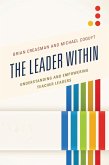Patricia Clark White, Thomas R. Harvey, Shari L. Fox
The Politically Intelligent Leader (eBook, PDF)
Dealing with the Dilemmas of a High-Stakes Educational Environment
28,95 €
inkl. MwSt.
Sofort per Download lieferbar

14 °P sammeln
Patricia Clark White, Thomas R. Harvey, Shari L. Fox
The Politically Intelligent Leader (eBook, PDF)
Dealing with the Dilemmas of a High-Stakes Educational Environment
- Format: PDF
- Merkliste
- Auf die Merkliste
- Bewerten Bewerten
- Teilen
- Produkt teilen
- Produkterinnerung
- Produkterinnerung

Bitte loggen Sie sich zunächst in Ihr Kundenkonto ein oder registrieren Sie sich bei
bücher.de, um das eBook-Abo tolino select nutzen zu können.
Hier können Sie sich einloggen
Hier können Sie sich einloggen
Sie sind bereits eingeloggt. Klicken Sie auf 2. tolino select Abo, um fortzufahren.

Bitte loggen Sie sich zunächst in Ihr Kundenkonto ein oder registrieren Sie sich bei bücher.de, um das eBook-Abo tolino select nutzen zu können.
Today's educational leaders are often caught in a world of rising expectations and diminishing resources - the political pressures are enormous. Those in the business of education often feel ill prepared and apprehensive about their ability to deal with a high-stakes political environment. The Politically Intelligent Leader helps leaders at all levels learn more about themselves and their own political styles. It provides strategies for delivering a personal educational vision, diagnosing others' styles, and customizing strategies to influence those who can help or hinder one's organizational…mehr
- Geräte: PC
- mit Kopierschutz
- eBook Hilfe
- Größe: 1.02MB
Andere Kunden interessierten sich auch für
![The Politically Intelligent Leader (eBook, ePUB) The Politically Intelligent Leader (eBook, ePUB)]() Patricia Clark WhiteThe Politically Intelligent Leader (eBook, ePUB)28,95 €
Patricia Clark WhiteThe Politically Intelligent Leader (eBook, ePUB)28,95 €![How Schools Succeed (eBook, PDF) How Schools Succeed (eBook, PDF)]() Edward L. HarrisHow Schools Succeed (eBook, PDF)36,95 €
Edward L. HarrisHow Schools Succeed (eBook, PDF)36,95 €![The Teacher Leader (eBook, PDF) The Teacher Leader (eBook, PDF)]() Daniel R. TomalThe Teacher Leader (eBook, PDF)38,95 €
Daniel R. TomalThe Teacher Leader (eBook, PDF)38,95 €![The Leader Within (eBook, PDF) The Leader Within (eBook, PDF)]() Brian K. CreasmanThe Leader Within (eBook, PDF)26,95 €
Brian K. CreasmanThe Leader Within (eBook, PDF)26,95 €![Become a Leader of Leaders (eBook, PDF) Become a Leader of Leaders (eBook, PDF)]() Mary Ellen FreeleyBecome a Leader of Leaders (eBook, PDF)22,95 €
Mary Ellen FreeleyBecome a Leader of Leaders (eBook, PDF)22,95 €![An Imperfect Leader (eBook, PDF) An Imperfect Leader (eBook, PDF)]() Peter L. StieplemanAn Imperfect Leader (eBook, PDF)21,95 €
Peter L. StieplemanAn Imperfect Leader (eBook, PDF)21,95 €![Leadership Intelligence (eBook, PDF) Leadership Intelligence (eBook, PDF)]() Wanda S. Maulding GreenLeadership Intelligence (eBook, PDF)21,95 €
Wanda S. Maulding GreenLeadership Intelligence (eBook, PDF)21,95 €-
-
-
Today's educational leaders are often caught in a world of rising expectations and diminishing resources - the political pressures are enormous. Those in the business of education often feel ill prepared and apprehensive about their ability to deal with a high-stakes political environment. The Politically Intelligent Leader helps leaders at all levels learn more about themselves and their own political styles. It provides strategies for delivering a personal educational vision, diagnosing others' styles, and customizing strategies to influence those who can help or hinder one's organizational goals as well as providing groundwork for leaders to understand how to operate ethically with all groups - elected boards, citizen groups, unions and volunteers - during politically volatile times.
Produktdetails
- Produktdetails
- Verlag: Bloomsbury eBooks US
- Seitenzahl: 220
- Erscheinungstermin: 14. Juli 2016
- Englisch
- ISBN-13: 9798765177181
- Artikelnr.: 74626100
- Verlag: Bloomsbury eBooks US
- Seitenzahl: 220
- Erscheinungstermin: 14. Juli 2016
- Englisch
- ISBN-13: 9798765177181
- Artikelnr.: 74626100
- Herstellerkennzeichnung Die Herstellerinformationen sind derzeit nicht verfügbar.
Patricia Clark White has been superintendent of three award-winning California school districts, a national and international consultant and presenter, and an executive coach to leaders dealing with political issues. She is currently a professor and associate dean for the School of Education at Brandman University, overseeing the doctoral program in Organizational Leadership.
Thomas R. Harvey is a professor of organizational leadership in the doctoral program at the University of La Verne. He has been the dean of the School of Organizational Management and the chairman of the Department of Educational Management for fourteen years and is the author of several books including Checklist for Change; The Practical Decision Maker; Building Teams, Building People; and The Soul of Leadership.
Shari L. Fox is currently an executive coach to K-12 site and district level administrators. She is also an adjunct professor and learning group leader at the University of La Verne. She had served as school superintendent prior to retirement and now finds great joy in volunteering in her grandson Payton's classroom where she can observe firsthand the "sandbox politics" that begin at an early age.
Thomas R. Harvey is a professor of organizational leadership in the doctoral program at the University of La Verne. He has been the dean of the School of Organizational Management and the chairman of the Department of Educational Management for fourteen years and is the author of several books including Checklist for Change; The Practical Decision Maker; Building Teams, Building People; and The Soul of Leadership.
Shari L. Fox is currently an executive coach to K-12 site and district level administrators. She is also an adjunct professor and learning group leader at the University of La Verne. She had served as school superintendent prior to retirement and now finds great joy in volunteering in her grandson Payton's classroom where she can observe firsthand the "sandbox politics" that begin at an early age.
Contents
Preface
Acknowledgements
Part I: Developing Your Political Intelligence
1The Politically Intelligent Leader Defined
This chapter defines the politically intelligent leader and discusses the
importance of raising your PIQ. It explains the difference between internal
and external politics, and shoots down some of the myths about politics.
2Blocks to Political Intelligence
Ten things that block leaders from using their political intelligence are
presented. Antidotes for each of them are discussed.
3Trust: The Heart of Effective Political Action
Trust is defined and explored as the core of all political strategies.
Presented are 10 strategies to build trusting relationships.
Part II: Using Smart Political Strategies
4External Strategies
Nineteen external political strategies are presented to be used by the
politically intelligent leader who is dealing with situations outside the
organization.
5Internal Strategies
Eighteen local political strategies are described, which can enhance power
and influence inside the organization.
Part III: Understanding How to Work with Political Styles
6Understanding Your Own Political Style
Through the use of an assessment instrument, The Inventory of Political
Styles, which is included here, readers are able to analyze their own
primary, secondary, and tertiary political styles. This chapter describes
nine political styles and offers insights about how typical behaviors
connected with each style can help or hinder the individual and the
organization.
7Working Effectively with Other Political Styles
The reader learns to analyze the political styles of other key players and
to customize a set of strategies that tend to be persuasive with those of
various styles.
Part IV: Staying on an Ethical Course in Politically Charged Situations
8The Politically Ethical Leader
Four Questions prompt reflection on ethical decisions in a political
environment.
9Dealing with Special Public Sector Groups
This chapter examines the unique political problems and strategies for
dealing with unions and union leadership, elected boards and councils,
volunteers, advisory groups, and foundations.
10The Machiavellian Leader
If you have the misfortune of working with a Machiavellian leader, then you
need to read this chapter thoroughly. In it we define such leadership and
give you ways to cope with this style.
11Digging Your Way Out of a Political Hole
Problems are examined that arise from digging yourself a political hole,
and tips are offered on how to get yourself out of it.
Part V: Pulling It All Together
12Practicing What We Preach
Scenarios give the reader practice in using the strategies and ideas
presented in the earlier chapters to become a politically intelligent
leader.
13Questions: We Get Questions
In this final chapter we answer the questions posed most often in our
speaking engagements.
Conclusion
Appendix: Inventory of Political Styles
References
Index
Preface
Acknowledgements
Part I: Developing Your Political Intelligence
1The Politically Intelligent Leader Defined
This chapter defines the politically intelligent leader and discusses the
importance of raising your PIQ. It explains the difference between internal
and external politics, and shoots down some of the myths about politics.
2Blocks to Political Intelligence
Ten things that block leaders from using their political intelligence are
presented. Antidotes for each of them are discussed.
3Trust: The Heart of Effective Political Action
Trust is defined and explored as the core of all political strategies.
Presented are 10 strategies to build trusting relationships.
Part II: Using Smart Political Strategies
4External Strategies
Nineteen external political strategies are presented to be used by the
politically intelligent leader who is dealing with situations outside the
organization.
5Internal Strategies
Eighteen local political strategies are described, which can enhance power
and influence inside the organization.
Part III: Understanding How to Work with Political Styles
6Understanding Your Own Political Style
Through the use of an assessment instrument, The Inventory of Political
Styles, which is included here, readers are able to analyze their own
primary, secondary, and tertiary political styles. This chapter describes
nine political styles and offers insights about how typical behaviors
connected with each style can help or hinder the individual and the
organization.
7Working Effectively with Other Political Styles
The reader learns to analyze the political styles of other key players and
to customize a set of strategies that tend to be persuasive with those of
various styles.
Part IV: Staying on an Ethical Course in Politically Charged Situations
8The Politically Ethical Leader
Four Questions prompt reflection on ethical decisions in a political
environment.
9Dealing with Special Public Sector Groups
This chapter examines the unique political problems and strategies for
dealing with unions and union leadership, elected boards and councils,
volunteers, advisory groups, and foundations.
10The Machiavellian Leader
If you have the misfortune of working with a Machiavellian leader, then you
need to read this chapter thoroughly. In it we define such leadership and
give you ways to cope with this style.
11Digging Your Way Out of a Political Hole
Problems are examined that arise from digging yourself a political hole,
and tips are offered on how to get yourself out of it.
Part V: Pulling It All Together
12Practicing What We Preach
Scenarios give the reader practice in using the strategies and ideas
presented in the earlier chapters to become a politically intelligent
leader.
13Questions: We Get Questions
In this final chapter we answer the questions posed most often in our
speaking engagements.
Conclusion
Appendix: Inventory of Political Styles
References
Index
Contents
Preface
Acknowledgements
Part I: Developing Your Political Intelligence
1The Politically Intelligent Leader Defined
This chapter defines the politically intelligent leader and discusses the
importance of raising your PIQ. It explains the difference between internal
and external politics, and shoots down some of the myths about politics.
2Blocks to Political Intelligence
Ten things that block leaders from using their political intelligence are
presented. Antidotes for each of them are discussed.
3Trust: The Heart of Effective Political Action
Trust is defined and explored as the core of all political strategies.
Presented are 10 strategies to build trusting relationships.
Part II: Using Smart Political Strategies
4External Strategies
Nineteen external political strategies are presented to be used by the
politically intelligent leader who is dealing with situations outside the
organization.
5Internal Strategies
Eighteen local political strategies are described, which can enhance power
and influence inside the organization.
Part III: Understanding How to Work with Political Styles
6Understanding Your Own Political Style
Through the use of an assessment instrument, The Inventory of Political
Styles, which is included here, readers are able to analyze their own
primary, secondary, and tertiary political styles. This chapter describes
nine political styles and offers insights about how typical behaviors
connected with each style can help or hinder the individual and the
organization.
7Working Effectively with Other Political Styles
The reader learns to analyze the political styles of other key players and
to customize a set of strategies that tend to be persuasive with those of
various styles.
Part IV: Staying on an Ethical Course in Politically Charged Situations
8The Politically Ethical Leader
Four Questions prompt reflection on ethical decisions in a political
environment.
9Dealing with Special Public Sector Groups
This chapter examines the unique political problems and strategies for
dealing with unions and union leadership, elected boards and councils,
volunteers, advisory groups, and foundations.
10The Machiavellian Leader
If you have the misfortune of working with a Machiavellian leader, then you
need to read this chapter thoroughly. In it we define such leadership and
give you ways to cope with this style.
11Digging Your Way Out of a Political Hole
Problems are examined that arise from digging yourself a political hole,
and tips are offered on how to get yourself out of it.
Part V: Pulling It All Together
12Practicing What We Preach
Scenarios give the reader practice in using the strategies and ideas
presented in the earlier chapters to become a politically intelligent
leader.
13Questions: We Get Questions
In this final chapter we answer the questions posed most often in our
speaking engagements.
Conclusion
Appendix: Inventory of Political Styles
References
Index
Preface
Acknowledgements
Part I: Developing Your Political Intelligence
1The Politically Intelligent Leader Defined
This chapter defines the politically intelligent leader and discusses the
importance of raising your PIQ. It explains the difference between internal
and external politics, and shoots down some of the myths about politics.
2Blocks to Political Intelligence
Ten things that block leaders from using their political intelligence are
presented. Antidotes for each of them are discussed.
3Trust: The Heart of Effective Political Action
Trust is defined and explored as the core of all political strategies.
Presented are 10 strategies to build trusting relationships.
Part II: Using Smart Political Strategies
4External Strategies
Nineteen external political strategies are presented to be used by the
politically intelligent leader who is dealing with situations outside the
organization.
5Internal Strategies
Eighteen local political strategies are described, which can enhance power
and influence inside the organization.
Part III: Understanding How to Work with Political Styles
6Understanding Your Own Political Style
Through the use of an assessment instrument, The Inventory of Political
Styles, which is included here, readers are able to analyze their own
primary, secondary, and tertiary political styles. This chapter describes
nine political styles and offers insights about how typical behaviors
connected with each style can help or hinder the individual and the
organization.
7Working Effectively with Other Political Styles
The reader learns to analyze the political styles of other key players and
to customize a set of strategies that tend to be persuasive with those of
various styles.
Part IV: Staying on an Ethical Course in Politically Charged Situations
8The Politically Ethical Leader
Four Questions prompt reflection on ethical decisions in a political
environment.
9Dealing with Special Public Sector Groups
This chapter examines the unique political problems and strategies for
dealing with unions and union leadership, elected boards and councils,
volunteers, advisory groups, and foundations.
10The Machiavellian Leader
If you have the misfortune of working with a Machiavellian leader, then you
need to read this chapter thoroughly. In it we define such leadership and
give you ways to cope with this style.
11Digging Your Way Out of a Political Hole
Problems are examined that arise from digging yourself a political hole,
and tips are offered on how to get yourself out of it.
Part V: Pulling It All Together
12Practicing What We Preach
Scenarios give the reader practice in using the strategies and ideas
presented in the earlier chapters to become a politically intelligent
leader.
13Questions: We Get Questions
In this final chapter we answer the questions posed most often in our
speaking engagements.
Conclusion
Appendix: Inventory of Political Styles
References
Index







